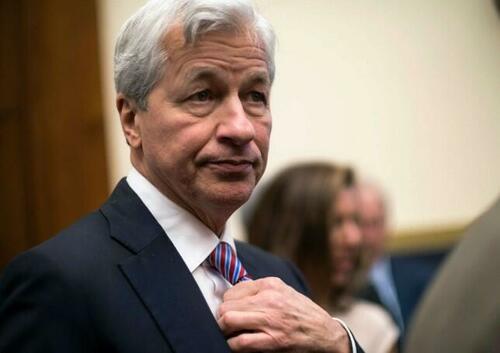We have been covering the full on implosion of ESG and "green" investing for the better part of the last 6 months and today, the wreckage continues.
That's because mega-bank JP Morgan has officially left a $68 trillion investor coalition that is "focused on pressing the world’s biggest emitters of greenhouse gases to decarbonize," according to Bloomberg.
In other words, the "fight" to decarbonize is imploding.
JP Morgan said it is leaving the Climate Action 100+ because it has "made significant investments in developing its own climate risk engagement framework", the report says. The bank claims to have 40 professionals now focused on sustainable investing.
And the damage for the Climate Action 100+ may only be getting started. Lance Dial, a Boston-based partner at law firm K&L Gates LLP, told Bloomberg: “I wouldn’t be surprised if we see more defections, especially given that there’s now a cost, such as potential litigation, that wasn’t there when companies joined.”
He added: “Attorneys general have subpoenaed firms about their membership of these groups.”
The group responded by saying its 700+ members are “committed to managing climate risk and preserving shareholder value through their participation in the initiative.”
The bank's involvement in CA100+ was initially seen as a significant step in its ESG investment journey. However, the initiative, alongside its participants, has faced increasing criticism from Republican circles in the U.S., labeling it and similar ESG efforts as politically motivated.
This criticism has led many investment firms to retreat from publicly aligning with net zero commitments and downplay their involvement in climate-focused finance groups, which are now considered more of a political burden than a merit.
Originally, CA100+ aimed to engage major companies like BP, Exxon Mobil, and Glencore in enhancing governance, cutting emissions, and improving climate financial disclosures, the report says. As the initiative enters a more proactive stage, asking members to ensure companies transition from plans to tangible emission reductions, the heightened activist stance poses additional difficulties for investors wishing to keep a lower profile in climate advocacy.
“The political winds aren’t rewarding climate-active firms today, but climate risk and regulations aren’t going away in the mid to long run, so short-term decisions may need to be undone when those longer term threats begin to manifest or regulators clamp down harder,” said Michael Sheren, a former senior adviser at the Bank of England who’s now a fellow at the Cambridge Institute for Sustainability Leadership.
“JPMorgan pulling out matters because it sends the wrong, short-sighted signal and gives cover for others to do the same," he added.
And we're sure they will...
We noted earlier this year, "ESG" has become a "dirty word" on Wall Street.
For some context, peak ESG and related synonyms, such as "climate change" and "clean energy" and green energy" and net zero," among other terms, peaked at 28,000 mentions in the first quarter of 2022. Ever since, the number of mentions has rapidly plunged. Halfway through the first quarter earnings season, mentions are around 4,800.
Recall, we have written about the dying off of ESG and "green" investment products over the last few months. Most recently, at the end of 2023, Goldman Sachs shuttered its ActiveBeta Paris-Aligned Climate U.S. Large Cap Equity ETF.
Bloomberg ETF analyst Eric Balchunas pointed out last month that "there was just way too much supply for the demand" with the ETF and that "it's going to get worse too". Balchunas says the ETF only took in $7 million over the course of 2 years.
We also wrote about Jeff Ubben late last year, who shuttered his sustainability fund - calling traditional climate summitry an “echo chamber” of diplomats.
Less than a week before that we noted that $30 billion had been shaved off the value of clean energy stocks over the preceding 6 months.
Finally, we pointed out last year how the ESG grift was reaching endgame after Markus Müller, chief investment officer ESG at Deutsche Bank's Private Bank stated that sustainability funds should include traditional energy stocks, arguing that not doing so deprives investors of a prime opportunity to invest in the transition to renewable energy.


